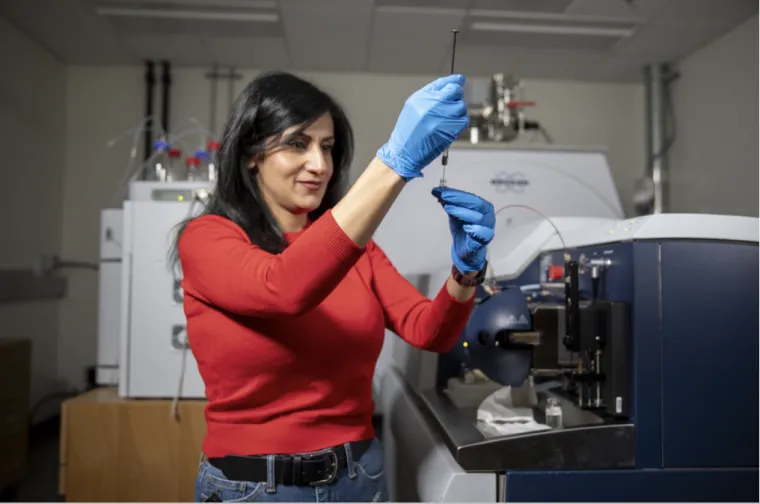Conversations with Rising Stars
MALAK TFAILY
As an associate professor in the Department of Environmental Science, Malak Tfaily leads a team to answer how, where and when organic matter formation and degradation takes place in different ecosystems. She admits that her research may seem complex, but this ecosystem scientist aims to provide insights into what drives life around us. Read about it in the latest Conversation with Rising Stars…

What initially attracted you to the current focus of research?
My lifelong fascination with chemistry and how chemical reactions control the world around us. I was trained as an analytical chemist, obtaining my PhD in analytical chemistry. This provided me with a strong foundation in using analytical tools to detect, identify, and quantify chemicals in complex systems. My research applies these analytical skills to understand how chemistry and biology intersect to impact life. I am interested in exploring this from environmental systems like soil and the atmosphere, to human biological systems. My goal is to elucidate the molecular mechanisms by which microbes, plants, humans, and ecological communities function and how molecules control the everyday activities of living organisms. I am attracted to the complexity of teasing apart these molecular interactions. My analytical chemistry background equipped me with the expertise to develop new methods and instruments to probe these systems. Uncovering fundamental chemical processes that drive our health, environment, agriculture, and more is the aim of my research. It is extremely rewarding to apply my chemistry knowledge to answer impactful questions through interdisciplinary research.
How have collaborations impacted my work on campus?
One of the first things that attracted me to the University of Arizona was the collaborative and interdisciplinary nature of this institution. I find great reward in working with people from different disciplines, as it helps me see problems and solutions from diverse perspectives. I believe the best science is interdisciplinary science, which is made possible through collaboration. My work has been highly collaborative, and I owe much of my knowledge and skills to colleagues I've met over my career. While interdisciplinary collaboration can be challenging at times, I've learned so much from scientists in fields like microbiology, ecology, geology and genomics. These partnerships have fundamentally impacted my research by exposing me to new techniques, theories, and ways of thinking. My collaborations on campus have enabled me to answer questions I could not address working alone. I am grateful to be part of a university that fosters this spirit of cooperation and exchange of ideas across departments and fields. Though my work is anchored in chemistry, it has been enriched and expanded by all those I've collaborated with on campus.
Research breakthroughs take time, so what keeps you motivated in your daily duties?
My profound fascination with the incredible secrets of life around us in this world that God created. I love exploring and uncovering new things, and this intrinsic joy keeps me going. Another big part of my motivation is being a role model for my kids and making my parents proud. Their love and support through my educational journey from Lebanon to the U.S. gives me determination to succeed. Finally, my students and research group members keep me motivated. I gain so much fulfillment from mentoring students, helping them grow in knowledge and become successful. Teaching allows me to treat each student as an individual and nurture their potential. Likewise, every member of my research group is deeply appreciated. I care about their growth and future. While breakthroughs take time, the opportunity to uncover new insights and guiding others makes every day rewarding. My motivation comes from doing work I love, and positively impacting others around me. My motto in life is "others". I believe helping others brings joy to yourself. As Philippians 2:3 states "Do nothing out of selfish ambition or vain conceit. Rather, in humility value others above yourselves." This encapsulates the source of my daily motivation.
What about your experience at the U of A makes you want to continue your career as a Wildcat?
I have felt welcomed and supported in my department, the College of Agriculture, Life and Environmental Sciences, and the broader research organization. Specifically, units like the Office of Research, Innovation and Impact, Research Development, and the BIO5 Institute have provided invaluable support for my work. I am grateful for the mentoring, funding opportunities, facilities, and interdisciplinary collaboration made available to me here.
When you describe your research to someone for the first time, what’s one major point you hope they understand?
While my research may seem complex on the surface, my goal is simple - to provide fundamental insights into the chemical reactions driving life around us. Understanding these molecular secrets will enable innovations to improve human health, sustain our environment, and grow nutritious food.

